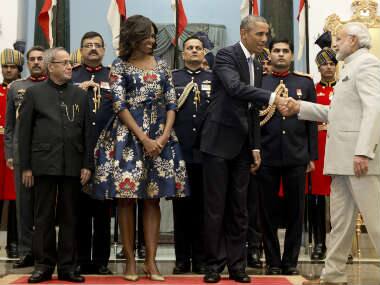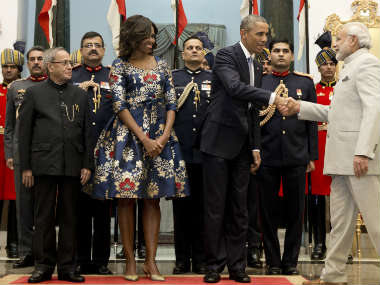Those who were glued to various Indian TV news channels on Sunday tracking United States President Barack Obama’s India visit and his summit meeting with Prime Minister Narendra Modi would be convinced that the Indo-US nuclear deal became “a done deal” and was operationalised on Day 1 of Obama’s three-day visit. But this would be a travesty of hard reality and reflects poorly on sensationalism electronic media routinely indulges in and Sunday was no exception. What happened on Sunday was a policy decision by the two principals, Obama and Modi, that the nuclear deal, which has been hanging fire for last over six years, would now be operationalised. It does not mean that the nuclear deal was operationalised on 25 January, 2015. On the contrary it will take weeks and months for all the technical nitty-gritty and fastening the very last set of nuts and bolts. Sample the remarks of the two principals at their media interaction in Hyderabad House in New Delhi on Sunday. Modi, who spoke first, said as follows: “The civil nuclear agreement was the centerpiece of our transformed relationship, which demonstrated new trust. It also created new economic opportunities and expanded our option for clean energy. In the course of the past four months, we have worked with a sense of purpose to move it forward. I am pleased that six years after we signed our bilateral agreement, we are moving towards commercial cooperation, consistent with our law, our international legal obligations, and technical and commercial viability.” [caption id=“attachment_2063805” align=“alignleft” width=“380”] US President Barack Obama, shakes hands with Prime Minister Narendra Modi, right, as first lady Michelle Obama and President Pranab Mukherjee, left, look at the Rashtrapati Bhavan in New Delhi. AP[/caption] One should not miss the key words in Modi’s remark “we are moving towards…” which means that it is not a done deal yet and that it is still to be operationalised. Now see the remarks of Obama in this context: “We are committed to moving towards full implementation. This is an important step that shows how we can work together to elevate our relationship.” Thus, Obama too has made it clear that it is a work in progress. US ambassador to India Richard Verma put things in context in his interaction with reporters when he said the two leaders today agreed to resolve differences over the liability of suppliers to India in the event of a nuclear accident and US demands on tracking the whereabouts of material supplied to the country. “Ultimately it’s up to the companies to go forward, but the two governments came to an understanding,” Verma said. Indian foreign secretary Sujatha Singh said it was a done deal in view of the understanding reached between the two sides. “We have broken the logjam of the past few years. There has been breakthrough in strategic, civil nuclear, defence and on economic sides. The deal is done. We have reached an understanding,” she said. Undoubtedly India and the US reached a breakthrough on Sunday. This happened after the US agreed to dump its persistent demand on flagging and tracking clause from the deal and the Indian government took some concrete steps, initiated by the UPA government in April 2014 as discussed in details by this writer
here.
The liability clause has been the biggest bugbear and prevented operationalisation of the Indo-US nuclear deal since it became a done deal in October 2008. Amandeep Singh Gill, joint secretary (disarmament) in the Ministry of External Affairs, made it clear at a briefing on Sunday that India was setting up an insurance pool of Rs 750 crore ($122 million) with the government contributing more at a later date. He said General Insurance Corp. and four other public sector companies will put up the cash, adding “This is a complete risk management solution for both operators and suppliers without causing undue financial burden.” Gill’s remark clearly implies that it will take some time for the deal to be operationalized. One should factor in the remarks made by US Deputy National Security Advisor Ben Rhodes to reporters in New Delhi on Sunday. Rhodes said the US received assurances that India will handle liability concerns according to international norms. “We are comfortable that India will live up to its international commitment to channel the liability to operators the way that’s become a custom for international practice the way our companies would expect. It’s ultimately now up to the companies to assess if it’s the right time, the right market, the right risk.” This should put things in perspective.
US President Barack Obama, shakes hands with Prime Minister Narendra Modi, right, as first lady Michelle Obama and President Pranab Mukherjee, left, look at the Rashtrapati Bhavan in New Delhi. AP[/caption] One should not miss the key words in Modi’s remark “we are moving towards…” which means that it is not a done deal yet and that it is still to be operationalised. Now see the remarks of Obama in this context: “We are committed to moving towards full implementation. This is an important step that shows how we can work together to elevate our relationship.” Thus, Obama too has made it clear that it is a work in progress. US ambassador to India Richard Verma put things in context in his interaction with reporters when he said the two leaders today agreed to resolve differences over the liability of suppliers to India in the event of a nuclear accident and US demands on tracking the whereabouts of material supplied to the country. “Ultimately it’s up to the companies to go forward, but the two governments came to an understanding,” Verma said. Indian foreign secretary Sujatha Singh said it was a done deal in view of the understanding reached between the two sides. “We have broken the logjam of the past few years. There has been breakthrough in strategic, civil nuclear, defence and on economic sides. The deal is done. We have reached an understanding,” she said. Undoubtedly India and the US reached a breakthrough on Sunday. This happened after the US agreed to dump its persistent demand on flagging and tracking clause from the deal and the Indian government took some concrete steps, initiated by the UPA government in April 2014 as discussed in details by this writer
here.
The liability clause has been the biggest bugbear and prevented operationalisation of the Indo-US nuclear deal since it became a done deal in October 2008. Amandeep Singh Gill, joint secretary (disarmament) in the Ministry of External Affairs, made it clear at a briefing on Sunday that India was setting up an insurance pool of Rs 750 crore ($122 million) with the government contributing more at a later date. He said General Insurance Corp. and four other public sector companies will put up the cash, adding “This is a complete risk management solution for both operators and suppliers without causing undue financial burden.” Gill’s remark clearly implies that it will take some time for the deal to be operationalized. One should factor in the remarks made by US Deputy National Security Advisor Ben Rhodes to reporters in New Delhi on Sunday. Rhodes said the US received assurances that India will handle liability concerns according to international norms. “We are comfortable that India will live up to its international commitment to channel the liability to operators the way that’s become a custom for international practice the way our companies would expect. It’s ultimately now up to the companies to assess if it’s the right time, the right market, the right risk.” This should put things in perspective.
Consulting Editor, Firstpost. Strategic analyst. Political commentator. Twitter handle @Kishkindha.
)